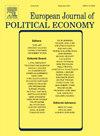The dynamics of revolutions
IF 2.4
3区 经济学
Q2 ECONOMICS
引用次数: 0
Abstract
We study the dynamics of revolutions by extending Kuran’s (1989) dynamic model of mass protests, allowing dissenters to choose not only whether to dissent but also how much. In the model, regimes may differ in how harshly they sanction small vs. large dissent; and societies may differ in how individuals perceive the cost of small vs. large deviations from their own ideological convictions. Such a generalization provides a typology of revolutions and predicts who is more likely to start a revolution: those whose ideology is close to the regime’s (moderates) or those far from it (extremists). It also provides predictions about the ideology they will express, how this will dynamically change during a revolution and about which policies may trigger a revolution and which may consolidate the regime’s strength. In particular, moderates are more likely to start a revolution if individuals are sensitive to even small deviations from their ideology. This sensitivity makes moderates voice their criticism despite only slightly disagreeing with the regime. Extremists, on the other hand, are silenced, because expressing their extreme views bears heavy sanctioning. This further implies that a popular policy may trigger or accelerate a revolution, because it indirectly spurs more people to become “moderate” hence speak their minds.
革命的动力
我们通过扩展Kuran(1989)的大规模抗议动态模型来研究革命的动态,允许持不同政见者不仅选择是否持不同政见者,而且选择持不同政见者的数量。在该模型中,政权在制裁小异议和大异议的严厉程度上可能有所不同;而且,在个人如何看待与自己的意识形态信念大小偏差的代价方面,社会可能会有所不同。这种概括提供了一种革命的类型,并预测了谁更有可能发动革命:那些意识形态与政权接近的人(温和派)还是那些远离政权的人(极端主义者)。它还提供了对他们将表达的意识形态的预测,这种意识形态在革命期间将如何动态变化,以及哪些政策可能引发革命,哪些政策可能巩固政权的力量。特别是,如果个人对与他们的理念稍有偏差都很敏感,那么温和派就更有可能发动革命。这种敏感性使得温和派尽管对政权只有轻微的异议,但仍会表达他们的批评。另一方面,极端分子则被噤声,因为表达他们的极端观点会受到严厉制裁。这进一步表明,一项受欢迎的政策可能会触发或加速一场革命,因为它间接地促使更多的人变得“温和”,从而说出他们的想法。
本文章由计算机程序翻译,如有差异,请以英文原文为准。
求助全文
约1分钟内获得全文
求助全文
来源期刊

European Journal of Political Economy
Multiple-
CiteScore
3.40
自引率
10.00%
发文量
106
期刊介绍:
The aim of the European Journal of Political Economy is to disseminate original theoretical and empirical research on economic phenomena within a scope that encompasses collective decision making, political behavior, and the role of institutions. Contributions are invited from the international community of researchers. Manuscripts must be published in English. Starting 2008, the European Journal of Political Economy is indexed in the Social Sciences Citation Index published by Thomson Scientific (formerly ISI).
 求助内容:
求助内容: 应助结果提醒方式:
应助结果提醒方式:


